
ACT Science Practice Test 50
Thời gian làm bài: 1 giờ
Đề thi nằm trong bộ sưu tập: Tuyển Tập Bộ Đề Thi Đại Học Hoa Kỳ (ACT) - Có Đáp Án Chi Tiết
Hãy bắt đầu chinh phục nào!
Xem trước nội dung:
PASSAGE VII
Several scientists considered some different environmental factors and their influence on the growth of certain bacteria. The following experiments used Salmonella bacteria to measure the effect of pH levels, nutrients, and temperature on the number of bacteria produced within a given time period.
Experiment 1
A known quantity of Salmonella bacteria was placed in each of 3 Petri dishes with the same nutrient concentration at the same temperature. The pH level of each nutrient concentration in each dish was varied according to Table 1. On the pH scale, 7 represents neutral, values less than 7 indicate an acid, and values greater than 7 indicate a base. The lids of the Petri dishes were replaced after the bacteria were added and the dishes were left alone. After 6 hours, the percent growth of Salmonella bacteria was recorded (Table 1).
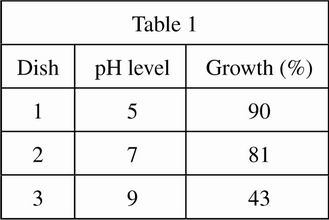
Experiment 2
A known quantity of Salmonella bacteria was placed in each of 3 Petri dishes with different nutrient concentrations in the form of organic compounds. The temperature and pH level (neutral 7) were held constant in each sample. The lids of the Petri dishes were replaced after the bacteria were added and the dishes were left alone. After 6 hours, the percent growth of Salmonella bacteria was recorded (Table 2).
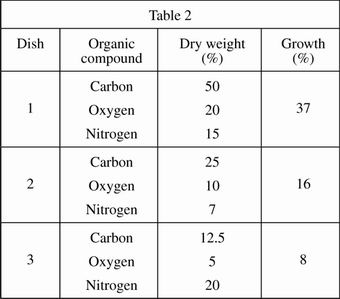
Experiment 3
A known quantity of Salmonella bacteria was placed in each of 3 Petri dishes at different temperatures. The pH level and nutrient concentrations were held constant. The lids of the Petri dishes were replaced after the bacteria were added and the dishes were left alone. After 6 hours, the percent growth of Salmonella bacteria was recorded (Table 3).
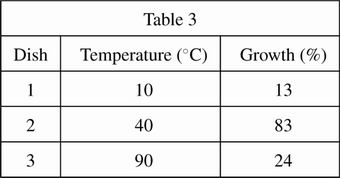
According to Table 1, what might best contribute to the growth of Salmonella bacteria?
A pH level above 9
A pH level below 5
A pH level near 7
A pH level near 5
According to the results of the three experiments, which combination of the three factors studied would be expected to produce the highest percent growth?
pH level of 5, organic compound in Dish 2, temperature of 40°C
pH level of 7, organic compound in Dish 2, temperature of 10°C
pH level of 5, organic compound in Dish 1, temperature of 40°C
pH level of 9, organic compound in Dish 1, temperature of 90°C
Which of the following conclusions is strengthened by the results of Experiment 1?
Bacteria will generally reproduce until all of the nutrients available have been depleted. How could Experiment 2 be altered to maximize the length of time that bacteria will reproduce?
Change the observation time from 6 hours to 12 hours.
Regularly re-supply each group of bacteria with unlimited nutrients.
Increase the rate of growth by decreasing the pH levels.
Do not test the effect of different nutrient combinations on growth.
Which of the following was the independent variable in Experiment 3?
pH level
temperature
organic compound
growth of bacteria
The experiments recorded the percent growth that occurred over a 6-hour period. Bacteria often reproduce at a rate that drastically varies from one stage to the next. The best way to study the different stages of growth would be to record the percent growth:
after 2 hours only.
after 4 hours, then again after 6 hours.
after 8 hours only.
every 15 minutes for 3 hours.
PASSAGE I
Friction is the resistance to the movement of one object past another object with which the first object is in contact. A group of students performed several experiments using rectangular blocks of various materials and a smooth inclined plane 2 meters in length. To compare how different materials are affected by friction, the blocks were placed at the top of the plane and released to travel the 2-meter distance. The time in seconds (s) that it took for each block to reach the end of the inclined plane was recorded.
Experiment 1
The group of students wanted to know which materials moved down the plane in the shortest amount of time. The students used blocks of wood, steel, aluminum, glass, plastic, and concrete. The dimensions of each block were the same, the volume of each block remained constant, and the mass of the blocks was varied. The incline of the plane was set at 45° for each trial. The students conducted 3 trials for each material, and recorded the results in Table 1.
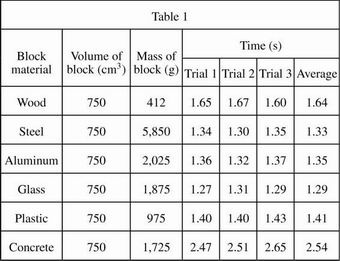
Experiment 2
The students conducted a similar experiment as in Experiment 1 to test the effect of volume on the time that it took for the blocks to move down the inclined plane. The results are shown in Table 2.
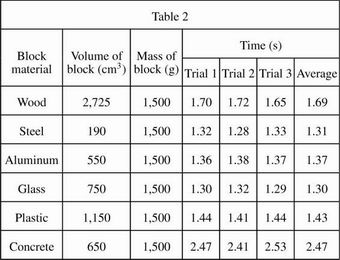
Experiment 3
Objects can be rated according to their ability to move efficiently. The students created a scale from 5 to 30 (least to most resistant to motion due to friction) and tested four objects of a known rating. Three trials were conducted for each object, using the same methods as in Experiment 1. The results are shown in Table 3.
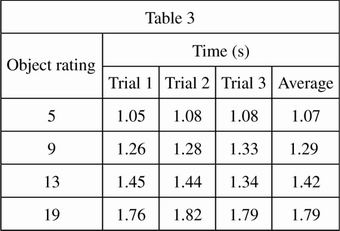
If Experiment 1 were repeated with a plane length of 4 meters, the movement time for the wood block, in seconds, would be closest to:
3.28
1.64
1.32
0.82
What value would the plastic object used in Experiment 2 likely have on the scale described in Experiment 3?
Less than 5
Between 5 and 9
Between 9 and 13
Between 13 and 19
A furniture maker wants to build a chair whose legs can move more easily across a smooth wooden floor. Based on Experiment 3, which of the following object ratings should the chair material have to best accomplish that goal?
5
9
13
19
In which of the following ways are the designs of Experiments 1 and 2 different?
In Experiment 1 mass was held constant, while in Experiment 2 it varied.
In Experiment 1 volume varied, while in Experiment 2 it was held constant.
In Experiment 1 volume was held constant, while in Experiment 2 mass was varied.
In Experiment 1 volume was held constant, while in Experiment 2 mass was held constant.
Based on the assumption that the loss in speed that is due to friction is responsible for longer travel times down the inclined plane, which of the following lists of objects used in Experiment 2 is in order of increasing loss of speed due to friction?
Plastic, aluminum, wood, concrete
Glass, aluminum, wood, concrete
Aluminum, steel, wood, concrete
Concrete, wood, glass, aluminum
Based on the results of Experiments 1 and 2, as the volume of the blocks increased, the average time it took each block to move down the inclined plane:
increased only.
decreased only.
increased for some blocks and decreased for other blocks.
remained the same.
Xem thêm đề thi tương tự

12 câu hỏi 1 mã đề 1 giờ
214,108 lượt xem 115,283 lượt làm bài

24 câu hỏi 1 mã đề 1 giờ
219,327 lượt xem 118,090 lượt làm bài

11 câu hỏi 1 mã đề 1 giờ
209,258 lượt xem 112,672 lượt làm bài

13 câu hỏi 1 mã đề 1 giờ
217,163 lượt xem 116,928 lượt làm bài

13 câu hỏi 1 mã đề 1 giờ
206,349 lượt xem 111,104 lượt làm bài

23 câu hỏi 1 mã đề 1 giờ
218,481 lượt xem 117,635 lượt làm bài

22 câu hỏi 1 mã đề 1 giờ
219,703 lượt xem 118,293 lượt làm bài

24 câu hỏi 1 mã đề 1 giờ
218,957 lượt xem 117,894 lượt làm bài

24 câu hỏi 1 mã đề 1 giờ
219,404 lượt xem 118,132 lượt làm bài
